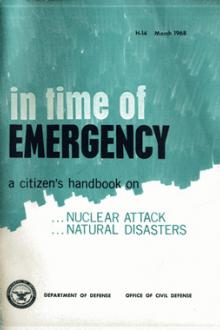Déjà Vu: A Technothriller by Hocking, Ian (red scrolls of magic .TXT) 📕

Read free book «Déjà Vu: A Technothriller by Hocking, Ian (red scrolls of magic .TXT) 📕» - read online or download for free at americanlibrarybooks.com
Read book online «Déjà Vu: A Technothriller by Hocking, Ian (red scrolls of magic .TXT) 📕». Author - Hocking, Ian
Hannah and Saskia walked over. She asked tersely, “So, have you decoded the transmission? Give me a report.”
“No we haven’t. It was a standard videophone transmission between here and America, possibly the West coast area or the Mid-West. It ran for about two minutes. There were two people involved.”
Hannah’s eyes were glassy. Saskia guessed that computing was not his forte. But was she an expert? Perhaps, because her next question was natural: “They were encrypted at source?”
“Yes,” said Besson. Abruptly, he became animated. “I know what you’re thinking: that Proctor’s side might have been picked up by a radio hack. They do listen.”
Besson mumbled. She had to remember what he said wait for her understanding to filter through. At length, Saskia said, “I am sure they do.”
“Let’s get some coffee and I’ll tell you about it,” Besson said. He stood up and walked over to one of the babbling machines. Saskia exchanged a glance with Hannah. Yes, his face said, he’s a maverick. Give him time.
Saskia remembered a nice English expression, but she had no opportunity to say it: Time is a luxury we cannot afford.
“Listen, Paul, we really appreciate this effort.”
“Not a problem, DI Hannah.”
They were standing by the machine. Saskia watched Besson make the coffee. He frowned with concentration. He seemed to be running through a mental checklist, picking up objects as they came to mind: cups, sugar, milk. Then she twigged. “You’re not with the police, are you, Paul?”
Besson gave her an owlish stare. “I was. Then I hit some trouble. I’m on a two-day release.”
Hannah put in, “He’s a non-profit hacker.”
“What did you do, Paul?” asked Saskia. He was pouring the coffee and his arm twitched. She wondered if interrupting him at such a crucial time had been a good idea.
“The multi-nationals,” Besson said to Saskia. He whispered it confidentially, as though that told her all she needed to know.
“The multi-nats?” she prompted. Besson nodded and handed her a coffee. He had added milk, but she sipped anyway.
“I diverted about a million dollars of their funds to various charities. African charities.” He added proudly, “I’m African.”
“Good for you,” she said, smiling.
Hannah grunted. It was an ambiguous noise, sarcastic or neutral depending on the listener. Besson thrust a mug of coffee at him so that some of it spilled onto the floor. It was black. “Thank you, Paul.”
“No problem.” Besson slurped the coffee and smacked his lips. He looked around. Then he remembered his report. “I was going to tell you about that transmission. You know anything about cryptography, Agent Brandt?”
“No,” she said.
“Fine.” He dropped his cup on a nearby desk to free his hands. They chopped and patted the air. “We’re talking English, right?”
“Right,” she said.
“In order for you to decode what I’m saying, you need to know the rules of English. By the same token, I need to know them too so that I can encode the message properly.” He made fists and shook them once. “The rules are the key. If they are wrong, then the message may only be partially understood. More likely it won’t be understood at all.”
“Fine so far.”
Besson looked into the distance for inspiration. In the pause, Saskia gave Hannah a little nod. They swapped coffees.
Saskia said, “Proctor’s transmission, Paul. Why is it so problematic?”
“Right,” Hannah interjected, “you can forget that name right now. I mean it.”
Besson folded his arms and giggled. “You did bad.”
Saskia looked defiantly at them both. “I do not agree with your superiors’ policy. And they have no control over my behaviour.”
“I like your attitude, Agent Brandt,” Besson said.
“All the same,” said Hannah, “we’ll keep things on a need-toknow basis where possible.”
Besson’s smile faded. His mind had already returned to his briefing on cryptography. “You see,” he said, “simple secret codes that apply the same rule to each letter, one after the other, are very old, and not so good because they can be easily cracked. The Romans and the Ancient Egyptians used those kinds of schemes, or ‘ciphers’. Because they are regularly applied to the same document, they lead to regularities in the product – the coded transmission. That is, any intercepted message will contain clues about the cipher, even when it appears to be scrambled. Proctor’s transmission doesn’t used that method. We’d have been surprised if it did.” Besson gestured to the other people in the room. “We would have cracked it before now.” He smiled and clicked his fingers. “Do you remember the Enigma code?”
Saskia frowned and looked at Hannah. He shook his head. “No,” she said.
“The Germans used it to encode military transmissions during the Second World War. The cool thing about the Enigma cipher was that it changed itself with each letter of the transmission. The odds against breaking it were 150 million million million to one. But it was cracked.”
“How?” asked Hannah.
“Simple. It was systematic. It was predictable. With modern computers we could break it easily. But if there is no system, then there is a real problem. I have a feeling that Proctor’s code falls into that category. I think it’s a one-time pad. Unbreakable.”
Hannah raked a hand through his grey hair. “Come on, how can it be unbreakable?”
“Easy. Just remove the systematicity.”
“What?” asked Saskia.
“We get rid of the pattern. Without the pattern, the chances of breaking the code are nearly zero. It would be like rolling a million dice and getting a six every time. I mean, really low. Unlike the Enigma code, there is no system behind it. That means it’s unpredictable. With Enigma, if you could work out the starting arrangement of the connecting wires and the position of the rotors on the machine itself, the cipher would be entirely predictable from then on. But the method we’re using here, a one-time pad, has no pattern. The sender has a copy of the huge cipher booklet needed to encode a message, and the receiver has a copy. Once used, they are never used again. Unbreakable.”
Hannah adjusted his tie. “Let’s just hope there was





Comments (0)